The Dharma Behind ‘The Compassionate Kitchen’
Written by: Thubten Chodron
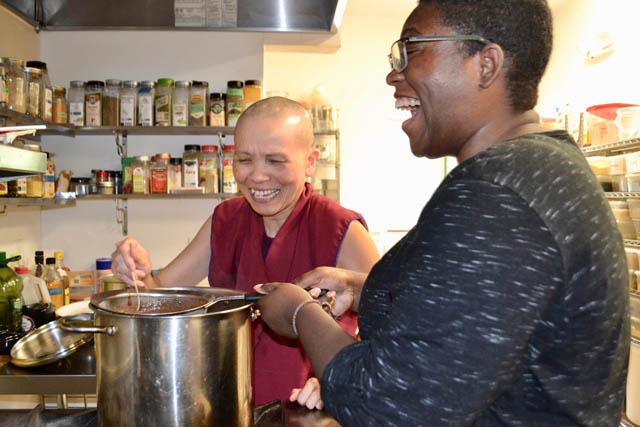
Ven. Thubten Pende and guest Rashika Stephens from Seattle strain chai together.
Photos by: Gen Heywood Photography, Shambhala Publications, Sravasti Abbey
Despite the title the new book, “The Compassionate Kitchen: Buddhist Practices for Eating with Mindfulness and Gratitude,” is a dharma book more than a food book.
It is based on a series of talks I gave at Sravasti Abbey, a Buddhist monastery in the northeast corner of Washington state, where I serve as abbess. The book describes different ways that people in all kinds of situations—families, couples, singles, and Buddhist monastics—can transform the activities associated with food into spiritual practice. Shambhala Publications published it in December.
Food nourishes our body and is indispensable for life and good health. Likewise, study, reflection, and meditation nourish us spiritually. “The Compassionate Kitchen” is about combining spiritual and physical nourishment to create healthy, happy and peaceful lives.
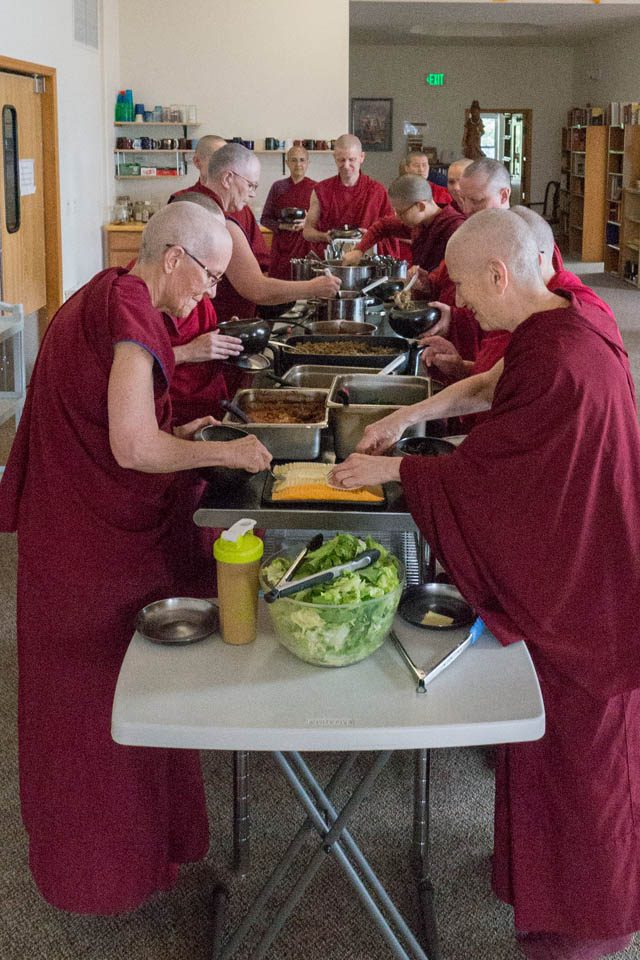
Giving and sharing food is one of the fundamental ways human beings connect with each other. In all cultures around the world, offering food shows our care and affection for others—both our human and animal friends. All of us depend on food to survive, so we share this essential ingredient of life with one another. In doing so we feel good about ourselves and connected to others.
At Sravasti Abbey we’ve adopted rituals and reflections from Tibetan and Chinese Buddhism that help us to approach our meals with mindfulness, respect and compassion. Over time, the guests and volunteers who visit the abbey and share meals with us, have wanted to know what these different rituals and recitations mean.
Some of our practices pertain mostly to monastic life. For example we never buy our own food at the abbey. All of it is offered by guests or volunteers, who shop from a monastic food fund that is supported by benefactors from all over the world.
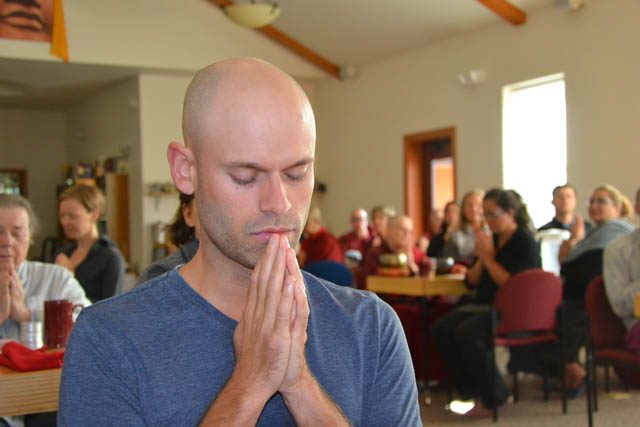
Other people send us care packages or bring bags full of food when they come to visit or stay with us. In this way we monastics remain constantly aware of our dependence on others, their kindness, and our commitment to serve sentient beings.
Most of our practices are easily adaptable to situations outside of the monastery, even for people who aren’t Buddhist. So, by request, I gave a series of short teachings on the practices we do around food. These were transcribed and edited and voila, there’s a book!
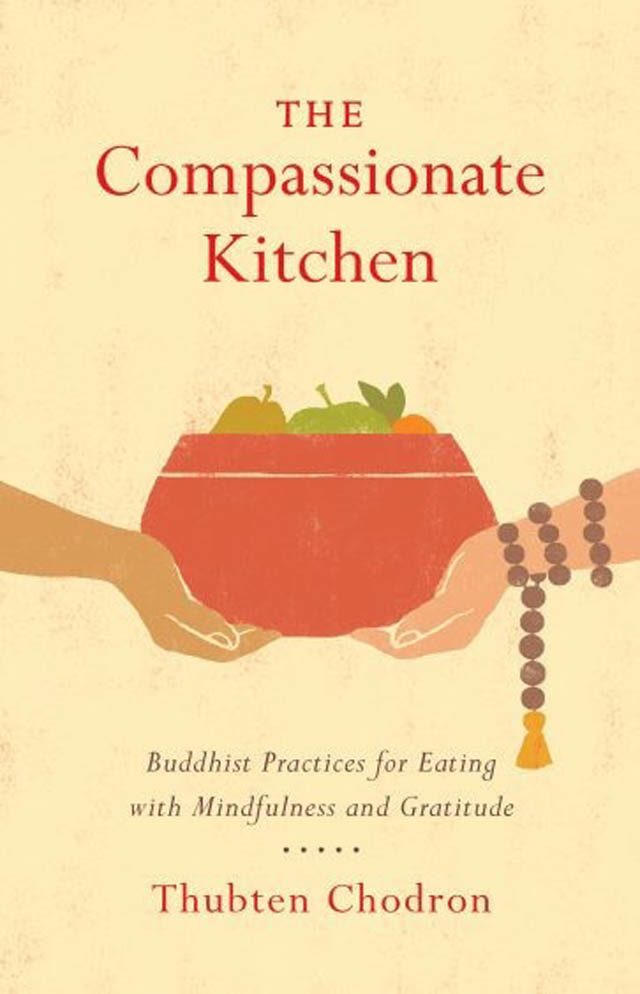
Motivation
Everybody eats. We have to. How we eat varies, and that’s what “The Compassionate Kitchen” addresses. By paying careful attention to our motivation, and being intentional about how we plan meals and shop for, prepare, serve and consume our food, we enrich our spiritual practice at the same time.
From the Buddhist point of view, our intention is the most important aspect of everything we do. Of course we eat to live, but a lot of other things drive us to consume food as well.
What’s on your mind when you make a quick stop for French fries on the way home from work? Or scarf down a bag of chips at your desk? We hardly notice, do we? These days, we can go to a pizza place, and when our slice comes over the counter, we bite into it before we even get to the cashier to pay for it. There’s little subtlety about food in America these days. We mostly just eat and run.
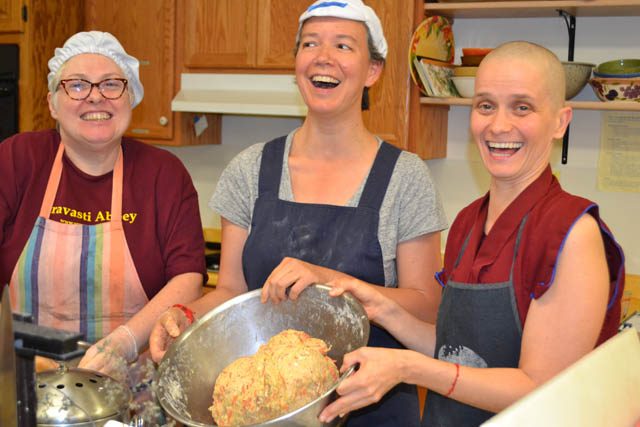
On the other hand, if we approach our pizza slice mindfully, reflecting on the infinite causes and conditions that make it available to us, we bring wisdom into the moment. If we reflect on the kindness of the countless living beings who made our pizza possible—the farmers, the cow who gave the milk for the cheese, the people who make the pizza boxes, and the teenager who works after school to take and make our order, to name just a few—gratitude arises.
If we take another moment to reflect, we realize that every one of these beings has a life story. Each one pursues happiness and avoids suffering just as fervently as we do. Seeing our commonality with others, our hearts open. When we think of the challenges each of these people experiences in their lives, compassion will naturally arise.
As we have a deeper relationship with this pizza and savor its tantalizing appeal, we can practice generosity by mentally offering it to the three jewels: the Buddha, dharma, and sangha. Doing this reminds us of our spiritual refuge, and our aspiration to actualize the qualities of the three jewels so we can benefit others more effectively.
We can think of all the beings who don’t have the good fortune to have food right now, and mentally share our pizza with all of them.
In this way our fast-food pizza slice induces a beautiful meditation that slows us down, opens our hearts, and creates virtuous thoughts in our mind, bringing us happiness now and in the future. It doesn’t take long to do this reflection—your pizza won’t get cold before you finish!
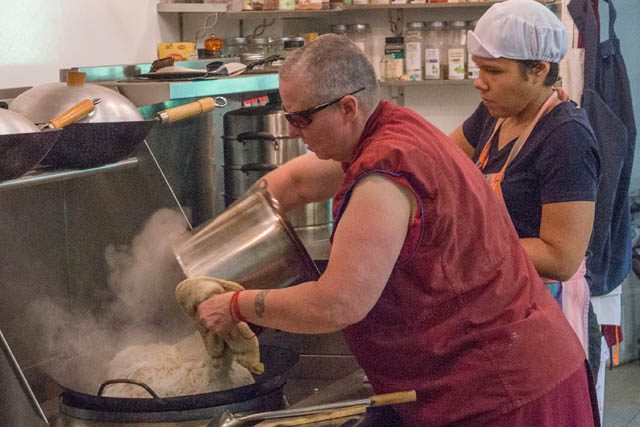
Verses for Reflection
Sravasti Abbey is now 15 years old. Over the years people have wanted to know how to develop a good motivation for various activities, so I have written verses to help with that. For example, the verse before we prepare a meal is:
“We will offer service by preparing a meal for the community of dharma practitioners. We are fortunate to have the opportunity to prepare and cook this food. The food will nourish their bodies and the love we put into preparing it will nourish their hearts…Let’s take joy in working harmoniously together for the benefit of all!”
Now imagine how thinking in that way could transform your daily “chore,” of feeding the family.
At the abbey we also have a motivational verse for starting our offering service (what other people call “work”) each day, and there’s another one to help our volunteer shoppers as they begin their service of shopping for groceries for the abbey community. We have contemplations before the meal that help set our mind in a good direction, and recitations to offer merit and gratitude after the meal. All of these are in the book and can be adapted to other situations
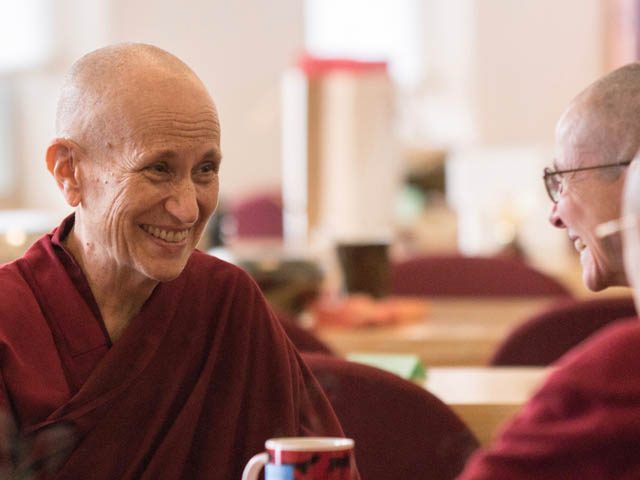
Connection
I hope “The Compassionate Kitchen” will also promote sharing meals, especially in families. When I was a child, dinner with the whole family was a must. You never skipped that. Nowadays people are coming and going every which way.
In the book I propose having family members gather together to offer the food and eat. While eating, you take the time to talk about how the day went with the people you care about the most. Ask your kids what they learned today and your spouse, partner, or housemate what they thought about today. Food and our customs around food provide an opportunity to bring sharing, warmth, communication, and understanding into friendships, families, and communities.
I love “The Compassionate Kitchen” cover, as it exemplifies sharing as the basis of all these practices. I can attest from experience that meals shared mindfully and with gratitude taste better, no matter what’s on the menu!
There’s more about The Compassionate Kitchen on ThubtenChodron.org.
Ordained as a Tibetan Buddhist nun in 1977, Venerable Thubten Chodron is an author, teacher, and the founder and abbess of Sravasti Abbey in Newport, Washington. Visit thubtenchodron.org for a media library of her teachings, and sravasti.org to learn more about the abbey.
